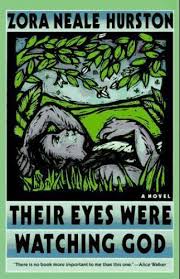Zora Neale Hurston
Listen to the Recess! Clip
| Author | Debra King |
| Air Date | 1/7/2002 |

Zora Neale Hurston Transcript
Zora Neale Hurston was born on January 7, 1891 in Notasulga, Alabama, though she would also claim that she was born in Eatonville, Florida, in 1901. That was just like Zora, the novelist, to rearrange the facts a little when it made for a better story. And in so many ways, telling, collecting, creating stories was what her life was all about.
Zora did grow up in the little town of Eatonville, where she moved with her parents, John and Lucy Ann Hurston, when she was three years old. Eatonville was the first incorporated Black community in America, and Zora would later write that it was a town “of five lakes, three croquet courts, three hundred brown skins, three hundred good swimmers, plenty guavas, two schools, and no jail house.” It was also full of stories, told over fences and under trees, at fishing spots and around campfires, and on every porch in town — especially the porch of Joe Clarke’s store, where Zora would sit and listen for hours to what was said and sung by the people who congregated there. She especially liked the “lying” sessions that the men of the town engaged in on Joe Clarke’s porch, each participant trying to outdo the other in their elaborate duels of verbal one-upmanship. It was here that Zora heard the Bre’er Rabbit stories and other lore, myths and legends that were a vital part of the African American oral tradition. When she grew up to become an anthropologist and a writer in the 1920s and 1930s, Zora would return to this material and to Eatonville as the source for some of her best-known fiction and for the collection of African American folklore Mules and Men, that made her famous. Her father, who was Eatonville’s preacher and mayor, was a stern man and didn’t approve of his young daughter’s passion for stories, whether she was listening to them or making them up with a cast of corn-husk dolls. But Zora’s mother Lucy encouraged her imaginative flights and gave her the phrase that stayed with Zora throughout her difficult life. “Jump at de sun,” her mother told her. “We might not land on the sun,” Zora added later, “but at least we would get off the ground.” Zora would be pleased to know that her stories have been inspiring generations of readers to take the same advice.